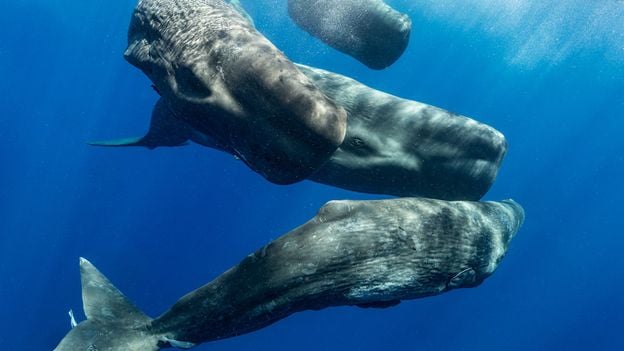- cross-posted to:
- earthlingliberationnotes@lemmy.world
- vegan@lemmy.world
- cross-posted to:
- earthlingliberationnotes@lemmy.world
- vegan@lemmy.world
Sperm whales communicate with each other using rhythmic sequences of clicks, called codas. It was previously thought that sperm whales had just 21 coda types. However, after studying almost 9,000 recordings, the Ceti researchers identified 156 distinct codas. They also noticed the basic building blocks of these codas which they describe as a “sperm whale phonetic alphabet” – much like phonemes, the units of sound in human language which combine to form words.
Pratyusha Sharma, a PhD student at MIT and lead author of the study, describes the “fine-grain changes” in vocalisations the AI identified. Each coda consists of between three and 40 rapid-fire clicks. The sperm whales were found to vary the overall speed, or the “tempo”, of the codas, as well as to speed up and slow down during the delivery of a coda, in other words, making it “rubato”. Sometimes they added an extra click at the end of a coda, akin, says Sharma, to “ornamentation” in music. These subtle variations, she says, suggest sperm whale vocalisations could carry a much richer amount of information than previously thought.



This is the best summary I could come up with:
Now, from elephants to dogs, modern technology is helping researchers to sift through enormous datasets, and uncover previously unknown diversity and complexity in animal communication.
They also noticed the basic building blocks of these codas which they describe as a “sperm whale phonetic alphabet” – much like phonemes, the units of sound in human language which combine to form words.
Pratyusha Sharma, a PhD student at MIT and lead author of the study, describes the “fine-grain changes” in vocalisations the AI identified.
The existence of a combinatorial coding system, write the report authors, is a prerequisite for “duality of patterning” – a linguistic phenomenon thought to be unique to human language – in which meaningless elements combine to form meaningful words.
Categorised as “vulnerable” by the International Union for Conservation of Nature (IUCN), sperm whales are still recovering from commercial hunting by humans in the 19th and 20th Centuries.
– If you liked this story, sign up for The Essential List newsletter – a handpicked selection of features, videos and can’t-miss news, delivered to your inbox twice a week.
The original article contains 1,360 words, the summary contains 179 words. Saved 87%. I’m a bot and I’m open source!
love how the newsletter registration CTA was aparently important enough to not shorten
I’ve blocked that useless bot.